#are google ads or facebook ads better
Text

I spent the last 11 months working with my illustrator, Marta, to make the children's book of my dreams. We were able to get every detail just the way I wanted, and I'm very happy with the final result. She is the best person I have ever worked with, and I mean, just look at those colors!

I wanted to tell that story of anyone's who ever felt that they didn't belong anywhere. Whether you are a nerd, autistic, queer, trans, a furry, or some combination of the above, it makes for a sad and difficult life. This isn't just my story. This is our story.

I also want to say the month following the book's launch has been very stressful. I have never done this kind of book before, and I didn't know how to get the word out about it. I do have a small publishing business and a full-time job, so I figured let's put my some money into advertising this time. Indie writers will tell you great success stories they've had using Facebook ads, so I started a page and boosting my posts.
Within a first few days, I got a lot of likes and shares and even a few people who requested the book and left great reviews for me. There were also people memeing on how the boy turns into a delicious venison steak at the end of the book. It was all in good fun, though. It honestly made made laugh. Things were great, so I made more posts and increased spending.

But somehow, someway these new posts ended up on the wrong side of the platform. Soon, we saw claims of how the book was perpetuating mental illness, of how this book goes against all of basic biology and logic, and how the lgbtq agenda was corrupting our kids.

This brought out even more people to support the book, so I just let them at it and enjoyed my time reading comments after work. A few days later, then conversation moved from politics to encouraging bullying, accusing others of abusing children, and a competition to who could post the most cruel image. They were just comments, however, and after all, people were still supporting the book.


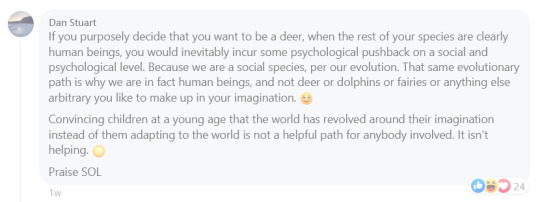
But then the trolls started organizing. Over night, I got hit with 3 one-star reviews on Amazon. My heart stopped. If your book ever falls below a certain rating, it can be removed, and blocked, and you can receive a strike on your publishing account. All that hard work was about to be deleted, and it was all my fault for posting it in the wrong place.


I panicked, pulled all my posts, and went into hiding, hoping things would die down. I reported the reviews and so did many others, but here's the thing you might have noticed across platforms like Google and Amazon. There are community guidelines that I referenced in my email, but unless people are doing something highly illegal, things are rarely ever taken down on these massive platforms. So those reviews are still there to this day. Once again, it's my fault, and I should have seen it coming.
Luckily, the harassment stopped, and the book is doing better now, at least in the US. The overall rating is still rickety in Europe, Canada, and Australia, so any reviews there help me out quite a lot.
I'm currently looking for a new home to post about the book and talk about everything that went into it. I also love to talk about all things books if you ever want to chat. Maybe I'll post a selfie one day, too. Otherwise, the book is still on Amazon, and the full story and illustrations are on YouTube as well if you want to read it for free.
#books#reading#childrens books#lgbtq#lgbtqia#autism#transgender#furry#therian#art#deer#queer#artists on tumblr#creativity#illustration
3K notes
·
View notes
Text
Forcing your computer to rat you out

Powerful people imprisoned by the cluelessness of their own isolation, locked up with their own motivated reasoning: “It’s impossible to get a CEO to understand something when his quarterly earnings call depends on him not understanding it.”
Take Mark Zuckerberg. Zuckerberg insists that anyone who wanted to use a pseudonym online is “two-faced,” engaged in dishonest social behavior. The Zuckerberg Doctrine claims that forcing people to use their own names is a way to ensure civility. This is an idea so radioactively wrong, it can be spotted from orbit.
From the very beginning, social scientists (both inside and outside Facebook) told Zuckerberg that he was wrong. People have lots of reasons to hide their identities online, both good and bad, but a Real Names Policy affects different people differently:
https://memex.craphound.com/2018/01/22/social-scientists-have-warned-zuck-all-along-that-the-facebook-theory-of-interaction-would-make-people-angry-and-miserable/
For marginalized and at-risk people, there are plenty of reasons to want to have more than one online identity — say, because you are a #MeToo whistleblower hoping that Harvey Weinstein won’t sic his ex-Mossad mercenaries on you:
https://www.newyorker.com/news/news-desk/harvey-weinsteins-army-of-spies
Or maybe you’re a Rohingya Muslim hoping to avoid the genocidal attentions of the troll army that used Facebook to organize — under their real, legal names — to rape and murder you and everyone you love:
https://www.amnesty.org/en/latest/news/2022/09/myanmar-facebooks-systems-promoted-violence-against-rohingya-meta-owes-reparations-new-report/
But even if no one is looking to destroy your life or kill you and your family, there are plenty of good reasons to present different facets of your identity to different people. No one talks to their lover, their boss and their toddler in exactly the same way, or reveals the same facts about their lives to those people. Maintaining different facets to your identity is normal and healthy — and the opposite, presenting the same face to everyone in your life, is a wildly terrible way to live.
None of this is controversial among social scientists, nor is it hard to grasp. But Zuckerberg stubbornly stuck to this anonymity-breeds-incivility doctrine, even as dictators used the fact that Facebook forced dissidents to use their real names to retain power through the threat (and reality) of arrest and torture:
https://pluralistic.net/2023/01/25/nationalize-moderna/#hun-sen
Why did Zuck cling to this dangerous and obvious fallacy? Because the more he could collapse your identity into one unitary whole, the better he could target you with ads. Truly, it is impossible to get a billionaire to understand something when his mega-yacht depends on his not understanding it.
This motivated reasoning ripples through all of Silicon Valley’s top brass, producing what Anil Dash calls “VC QAnon,” the collection of conspiratorial, debunked and absurd beliefs embraced by powerful people who hold the digital lives of billions of us in their quivering grasp:
https://www.anildash.com/2023/07/07/vc-qanon/
These fallacy-ridden autocrats like to disguise their demands as observations, as though wanting something to be true was the same as making it true. Think of when Eric Schmidt — then the CEO of Google — dismissed online privacy concerns, stating “If you have something that you don’t want anyone to know, maybe you shouldn’t be doing it in the first place”:
https://www.eff.org/deeplinks/2009/12/google-ceo-eric-schmidt-dismisses-privacy
Schmidt was echoing the sentiments of his old co-conspirator, Sun Microsystems CEO Scott McNealy: “You have zero privacy anyway. Get over it”:
https://www.wired.com/1999/01/sun-on-privacy-get-over-it/
Both men knew better. Schmidt, in particular, is very jealous of his own privacy. When Cnet reporters used Google to uncover and publish public (but intimate and personal) facts about Schmidt, Schmidt ordered Google PR to ignore all future requests for comment from Cnet reporters:
https://www.cnet.com/tech/tech-industry/how-cnet-got-banned-by-google/
(Like everything else he does, Elon Musk’s policy of responding to media questions about Twitter with a poop emoji is just him copying things other people thought up, making them worse, and taking credit for them:)
https://www.theverge.com/23815634/tesla-elon-musk-origin-founder-twitter-land-of-the-giants
Schmidt’s actions do not reflect an attitude of “If you have something that you don’t want anyone to know, maybe you shouldn’t be doing it in the first place.” Rather, they are the normal response that we all have to getting doxed.
When Schmidt and McNealy and Zuck tell us that we don’t have privacy, or we don’t want privacy, or that privacy is bad for us, they’re disguising a demand as an observation. “Privacy is dead” actually means, “When privacy is dead, I will be richer than you can imagine, so stop trying to save it, goddamnit.”
We are all prone to believing our own bullshit, but when a tech baron gets high on his own supply, his mental contortions have broad implications for all of us. A couple years after Schmidt’s anti-privacy manifesto, Google launched Google Plus, a social network where everyone was required to use their “real name.”
This decision — justified as a means of ensuring civility and a transparent ruse to improve ad targeting — kicked off the Nym Wars:
https://epeus.blogspot.com/2011/08/google-plus-must-stop-this-identity.html
One of the best documents to come out of that ugly conflict is “Falsehoods Programmers Believe About Names,” a profound and surprising enumeration of all the ways that the experiences of tech bros in Silicon Valley are the real edge-cases, unreflective of the reality of billions of their users:
https://www.kalzumeus.com/2010/06/17/falsehoods-programmers-believe-about-names/
This, in turn, spawned a whole genre of programmer-fallacy catalogs, falsehoods programmers believe about time, currency, birthdays, timezones, email addresses, national borders, nations, biometrics, gender, language, alphabets, phone numbers, addresses, systems of measurement, and, of course, families:
https://github.com/kdeldycke/awesome-falsehood
But humility is in short supply in tech. It’s impossible to get a programmer to understand something when their boss requires them not to understand it. A programmer will happily insist that ordering you to remove your “mask” is for your own good — and not even notice that they’re taking your skin off with it.
There are so many ways that tech executives could improve their profits if only we would abandon our stubborn attachment to being so goddamned complicated. Think of Netflix and its anti-passsword-sharing holy war, which is really a demand that we redefine “family” to be legible and profitable for Netflix:
https://pluralistic.net/2023/02/02/nonbinary-families/#red-envelopes
But despite the entreaties of tech companies to collapse our identities, our families, and our online lives into streamlined, computably hard-edged shapes that fit neatly into their database structures, we continue to live fuzzy, complicated lives that only glancingly resemble those of the executives seeking to shape them.
Now, the rich, powerful people making these demands don’t plan on being constrained by them. They are conservatives, in the tradition of #FrankWilhoit, believers in a system of “in-groups whom the law protects but does not bind, alongside out-groups whom the law binds but does not protect”:
https://crookedtimber.org/2018/03/21/liberals-against-progressives/#comment-729288
As with Schmidt’s desire to spy on you from asshole to appetite for his own personal gain, and his violent aversion to having his own personal life made public, the tech millionaires and billionaires who made their fortune from the flexibility of general purpose computers would like to end that flexibility. They insist that the time for general purpose computers has passed, and that today, “consumers” crave the simplicity of appliances:
https://memex.craphound.com/2012/01/10/lockdown-the-coming-war-on-general-purpose-computing/
It is in the War On General Purpose Computing that we find the cheapest and flimsiest rhetoric. Companies like Apple — and their apologists — insist that no one wants to use third-party app stores, or seek out independent repair depots — and then spend millions to make sure that it’s illegal to jailbreak your phone or get it fixed outside of their own official channel:
https://doctorow.medium.com/apples-cement-overshoes-329856288d13
The cognitive dissonance of “no one wants this,” and “we must make it illegal to get this” is powerful, but the motivated reasoning is more powerful still. It is impossible to get Tim Cook to understand something when his $49 million paycheck depends on him not understanding it.
The War on General Purpose Computing has been underway for decades. Computers, like the people who use them, stubbornly insist on being reality-based, and the reality of computers is that they are general purpose. Every computer is a Turing complete, universal Von Neumann machine, which means that it can run every valid program. There is no way to get a computer to be almost Turing Complete, only capable of running programs that don’t upset your shareholders’ fragile emotional state.
There is no such thing as a printer that will only run the “reject third-party ink” program. There is no such thing as a phone that will only run the “reject third-party apps” program. There are only laws, like the Section 1201 of the Digital Millennium Copyright Act, that make writing and distributing those programs a felony punishable by a five-year prison sentence and a $500,000 fine (for a first offense).
That is to say, the War On General Purpose Computing is only incidentally a technical fight: it is primarily a legal fight. When Apple says, “You can’t install a third party app store on your phone,” what they means is, “it’s illegal to install that third party app store.” It’s not a technical countermeasure that stands between you and technological self-determination, it’s a legal doctrine we can call “felony contempt of business model”:
https://locusmag.com/2020/09/cory-doctorow-ip/
But the mighty US government will not step in to protect a company’s business model unless it at least gestures towards the technical. To invoke DMCA 1201, a company must first add the thinnest skin of digital rights management to their product. Since 1201 makes removing DRM illegal, a company can use this molecule-thick scrim of DRM to felonize any activity that the DRM prevents.
More than 20 years ago, technologists started to tinker with ways to combine the legal and technical to tame the wild general purpose computer. Starting with Microsoft’s Palladium project, they theorized a new “Secure Computing” model for allowing companies to reach into your computer long after you had paid for it and brought it home, in order to discipline you for using it in ways that undermined its shareholders’ interest.
Secure Computing began with the idea of shipping every computer with two CPUs. The first one was the normal CPU, the one you interacted with when you booted it up, loaded your OS, and ran programs. The second CPU would be a Trusted Platform Module, a brute-simple system-on-a-chip designed to be off-limits to modification, even by its owner (that is, you).
The TPM would ship with a limited suite of simple programs it could run, each thoroughly audited for bugs, as well as secret cryptographic signing keys that you were not permitted to extract. The original plan called for some truly exotic physical security measures for that TPM, like an acid-filled cavity that would melt the chip if you tried to decap it or run it through an electron-tunneling microscope:
https://pluralistic.net/2020/12/05/trusting-trust/#thompsons-devil
This second computer represented a crack in the otherwise perfectly smooth wall of a computer’s general purposeness; and Trusted Computing proposed to hammer a piton into that crack and use it to anchor a whole superstructure that could observe — and limited — the activity of your computer.
This would start with observation: the TPM would observe every step of your computer’s boot sequence, creating cryptographic hashes of each block of code as it loaded and executed. Each stage of the boot-up could be compared to “known good” versions of those programs. If your computer did something unexpected, the TPM could halt it in its tracks, blocking the boot cycle.
What kind of unexpected things do computers do during their boot cycle? Well, if your computer is infected with malware, it might load poisoned versions of its operating system. Once your OS is poisoned, it’s very hard to detect its malicious conduct, since normal antivirus programs rely on the OS to faithfully report what your computer is doing. When the AV program asks the OS to tell it which programs are running, or which files are on the drive, it has no choice but to trust the OS’s response. When the OS is compromised, it can feed a stream of lies to users’ programs, assuring these apps that everything is fine.
That’s a very beneficial use for a TPM, but there’s a sinister flipside: the TPM can also watch your boot sequence to make sure that there aren’t beneficial modifications present in your operating system. If you modify your OS to let you do things the manufacturer wants to prevent — like loading apps from a third-party app-store — the TPM can spot this and block it.
Now, these beneficial and sinister uses can be teased apart. When the Palladium team first presented its research, my colleague Seth Schoen proposed an “owner override”: a modification of Trusted Computing that would let the computer’s owner override the TPM:
https://web.archive.org/web/20021004125515/http://vitanuova.loyalty.org/2002-07-05.html
This override would introduce its own risks, of course. A user who was tricked into overriding the TPM might expose themselves to malicious software, which could harm that user, as well as attacking other computers on the user’s network and the other users whose data were on the compromised computer’s drive.
But an override would also provide serious benefits: it would rule out the monopolistic abuse of a TPM to force users to run malicious code that the manufacturer insisted on — code that prevented the user from doing things that benefited the user, even if it harmed the manufacturer’s shareholders. For example, with owner override, Microsoft couldn’t force you to use its official MS Office programs rather than third-party compatible programs like Apple’s iWork or Google Docs or LibreOffice.
Owner override also completely changed the calculus for another, even more dangerous part of Trusted Computing: remote attestation.
Remote Attestation is a way for third parties to request a reliable, cryptographically secured assurances about which operating system and programs your computer is running. In Remote Attestation, the TPM in your computer observes every stage of your computer’s boot, gathers information about all the programs you’re running, and cryptographically signs them, using the signing keys the manufacturer installed during fabrication.
You can send this “attestation” to other people on the internet. If they trust that your computer’s TPM is truly secure, then they know that you have sent them a true picture of your computer’s working (the actual protocol is a little more complicated and involves the remote party sending you a random number to cryptographically hash with the attestation, to prevent out-of-date attestations).
Now, this is also potentially beneficial. If you want to make sure that your technologically unsophisticated friend is running an uncompromised computer before you transmit sensitive data to it, you can ask them for an attestation that will tell you whether they’ve been infected with malware.
But it’s also potentially very sinister. Your government can require all the computers in its borders to send a daily attestation to confirm that you’re still running the mandatory spyware. Your abusive spouse — or abusive boss — can do the same for their own disciplinary technologies. Such a tool could prevent you from connecting to a service using a VPN, and make it impossible to use Tor Browser to protect your privacy when interacting with someone who wishes you harm.
The thing is, it’s completely normal and good for computers to lie to other computers on behalf of their owners. Like, if your IoT ebike’s manufacturer goes out of business and all their bikes get bricked because they can no longer talk to their servers, you can run an app that tricks the bike into thinking that it’s still talking to the mothership:
https://nltimes.nl/2023/07/15/alternative-app-can-unlock-vanmoof-bikes-popular-amid-bankruptcy-fears
Or if you’re connecting to a webserver that tries to track you by fingerprinting you based on your computer’s RAM, screen size, fonts, etc, you can order your browser to send random data about this stuff:
https://jshelter.org/fingerprinting/
Or if you’re connecting to a site that wants to track you and nonconsensually cram ads into your eyeballs, you can run an adblocker that doesn’t show you the ads, but tells the site that it did:
https://www.eff.org/deeplinks/2019/07/adblocking-how-about-nah
Owner override leaves some of the beneficial uses of remote attestation intact. If you’re asking a friend to remotely confirm that your computer is secure, you’re not going to use an override to send them bad data about about your computer’s configuration.
And owner override also sweeps all of the malicious uses of remote attestation off the board. With owner override, you can tell any lie about your computer to a webserver, a site, your boss, your abusive spouse, or your government, and they can’t spot the lie.
But owner override also eliminates some beneficial uses of remote attestation. For example, owner override rules out remote attestation as a way for strangers to play multiplayer video games while confirming that none of them are using cheat programs (like aimhack). It also means that you can’t use remote attestation to verify the configuration of a cloud server you’re renting in order to assure yourself that it’s not stealing your data or serving malware to your users.
This is a tradeoff, and it’s a tradeoff that’s similar to lots of other tradeoffs we make online, between the freedom to do something good and the freedom to do something bad. Participating anonymously, contributing to free software, distributing penetration testing tools, or providing a speech platform that’s open to the public all represent the same tradeoff.
We have lots of experience with making the tradeoff in favor of restrictions rather than freedom: powerful bad actors are happy to attach their names to their cruel speech and incitement to violence. Their victims are silenced for fear of that retaliation.
When we tell security researchers they can’t disclose defects in software without the manufacturer’s permission, the manufacturers use this as a club to silence their critics, not as a way to ensure orderly updates.
When we let corporations decide who is allowed to speak, they act with a mixture of carelessness and self-interest, becoming off-the-books deputies of authoritarian regimes and corrupt, powerful elites.
Alas, we made the wrong tradeoff with Trusted Computing. For the past twenty years, Trusted Computing has been creeping into our devices, albeit in somewhat denatured form. The original vision of acid-filled secondary processors has been replaced with less exotic (and expensive) alternatives, like “secure enclaves.” With a secure enclave, the manufacturer saves on the expense of installing a whole second computer, and instead, they draw a notional rectangle around a region of your computer’s main chip and try really hard to make sure that it can only perform a very constrained set of tasks.
This gives us the worst of all worlds. When secure enclaves are compromised, we not only lose the benefit of cryptographic certainty, knowing for sure that our computers are only booting up trusted, unalterted versions of the OS, but those compromised enclaves run malicious software that is essentially impossible to detect or remove:
https://pluralistic.net/2022/07/28/descartes-was-an-optimist/#uh-oh
But while Trusted Computing has wormed its way into boot-restrictions — preventing you from jailbreaking your computer so it will run the OS and apps of your choosing — there’s been very little work on remote attestation…until now.
Web Environment Integrity is Google’s proposal to integrate remote attestation into everyday web-browsing. The idea is to allow web-servers to verify what OS, extensions, browser, and add-ons your computer is using before the server will communicate with you:
https://github.com/RupertBenWiser/Web-Environment-Integrity/blob/main/explainer.md
Even by the thin standards of the remote attestation imaginaries, there are precious few beneficial uses for this. The googlers behind the proposal have a couple of laughable suggestions, like, maybe if ad-supported sites can comprehensively refuse to serve ad-blocking browsers, they will invest the extra profits in making things you like. Or: letting websites block scriptable browsers will make it harder for bad people to auto-post fake reviews and comments, giving users more assurances about the products they buy.
But foundationally, WEI is about compelling you to disclose true facts about yourself to people who you want to keep those facts from. It is a Real Names Policy for your browser. Google wants to add a new capability to the internet: the ability of people who have the power to force you to tell them things to know for sure that you’re not lying.
The fact that the authors assume this will be beneficial is just another “falsehood programmers believe”: there is no good reason to hide the truth from other people. Squint a little and we’re back to McNealy’s “Privacy is dead, get over it.” Or Schmidt’s “If you have something that you don’t want anyone to know, maybe you shouldn’t be doing it in the first place.”
And like those men, the programmers behind this harebrained scheme don’t imagine that it will ever apply to them. As Chris Palmer — who worked on Chromium — points out, this is not compatible with normal developer tools or debuggers, which are “incalculably valuable and not really negotiable”:
https://groups.google.com/a/chromium.org/g/blink-dev/c/Ux5h_kGO22g/m/5Lt5cnkLCwAJ
This proposal is still obscure in the mainstream, but in tech circles, it has precipitated a flood of righteous fury:
https://arstechnica.com/gadgets/2023/07/googles-web-integrity-api-sounds-like-drm-for-the-web/
As I wrote last week, giving manufacturers the power to decide how your computer is configured, overriding your own choices, is a bad tradeoff — the worst tradeoff, a greased slide into terminal enshittification:
https://pluralistic.net/2023/07/24/rent-to-pwn/#kitt-is-a-demon
This is how you get Unauthorized Bread:
https://arstechnica.com/gaming/2020/01/unauthorized-bread-a-near-future-tale-of-refugees-and-sinister-iot-appliances/
All of which leads to the question: what now? What should be done about WEI and remote attestation?
Let me start by saying: I don’t think it should be illegal for programmers to design and release these tools. Code is speech, and we can’t understand how this stuff works if we can’t study it.
But programmers shouldn’t deploy it in production code, in the same way that programmers should be allowed to make pen-testing tools, but shouldn’t use them to attack production systems and harm their users. Programmers who do this should be criticized and excluded from the society of their ethical, user-respecting peers.
Corporations that use remote attestation should face legal restrictions: privacy law should prevent the use of remote attestation to compel the production of true facts about users or the exclusion of users who refuse to produce those facts. Unfair competition law should prevent companies from using remote attestation to block interoperability or tie their products to related products and services.
Finally, we must withdraw the laws that prevent users and programmers from overriding TPMs, secure enclaves and remote attestations. You should have the right to study and modify your computer to produce false attestations, or run any code of your choosing. Felony contempt of business model is an outrage. We should alter or strike down DMCA 1201, the Computer Fraud and Abuse Act, and other laws (like contract law’s “tortious interference”) that stand between you and “sole and despotic dominion” over your own computer. All of that applies not just to users who want to reconfigure their own computers, but also toolsmiths who want to help them do so, by offering information, code, products or services to jailbreak and alter your devices.
Tech giants will squeal at this, insisting that they serve your interests when they prevent rivals from opening up their products. After all, those rivals might be bad guys who want to hurt you. That’s 100% true. What is likewise true is that no tech giant will defend you from its own bad impulses, and if you can’t alter your device, you are powerless to stop them:
https://pluralistic.net/2022/11/14/luxury-surveillance/#liar-liar
Companies should be stopped from harming you, but the right place to decide whether a business is doing something nefarious isn’t in the boardroom of that company’s chief competitor: it’s in the halls of democratically accountable governments:
https://www.eff.org/wp/interoperability-and-privacy
So how do we get there? Well, that’s another matter. In my next book, The Internet Con: How to Seize the Means of Computation (Verso Books, Sept 5), I lay out a detailed program, describing which policies will disenshittify the internet, and how to get those policies:
https://www.versobooks.com/products/3035-the-internet-con
Predictably, there are challenges getting this kind of book out into the world via our concentrated tech sector. Amazon refuses to carry the audio edition on its monopoly audiobook platform, Audible, unless it is locked to Amazon forever with mandatory DRM. That’s left me self-financing my own DRM-free audio edition, which is currently available for pre-order via this Kickstarter:
http://seizethemeansofcomputation.org
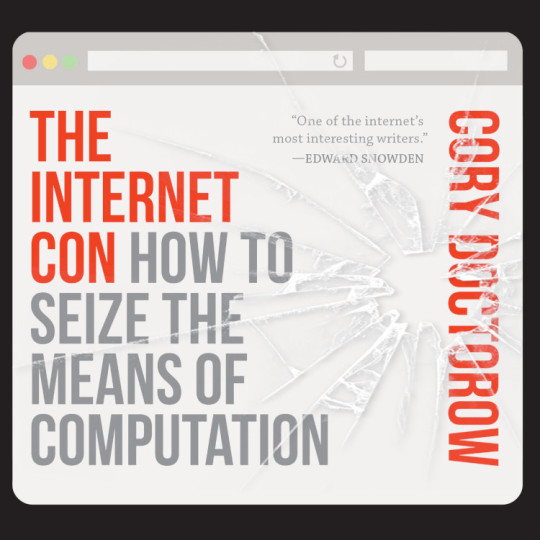
I’m kickstarting the audiobook for “The Internet Con: How To Seize the Means of Computation,” a Big Tech disassembly manual to disenshittify the web and bring back the old, good internet. It’s a DRM-free book, which means Audible won’t carry it, so this crowdfunder is essential. Back now to get the audio, Verso hardcover and ebook:
https://www.kickstarter.com/projects/doctorow/the-internet-con-how-to-seize-the-means-of-computation

If you’d like an essay-formatted version of this post to read or share, here’s a link to it on pluralistic.net, my surveillance-free, ad-free, tracker-free blog:
https://pluralistic.net/2023/08/02/self-incrimination/#wei-bai-bai

[Image ID: An anatomical drawing of a flayed human head; it has been altered to give it a wide-stretched mouth revealing a gadget nestled in the back of the figure's throat, connected by a probe whose two coiled wires stretch to an old fashioned electronic box. The head's eyes have been replaced by the red, menacing eye of HAL 9000 from Stanley Kubrick's '2001: A Space Odyssey.' Behind the head is a code waterfall effect as seen in the credits of the Wachowskis' 'The Matrix.']

Image:
Cryteria (modified)
https://commons.wikimedia.org/wiki/File:HAL9000.svg
CC BY 3.0
https://creativecommons.org/licenses/by/3.0/deed.en
#pluralistic#chaffing#spoofing#remote attestation#rene descartes#adversarial interoperability#war on general purpose computing#canvas attacks#vpns#compelled speech#onion routing#owner override#stalkerware#ngscb#palladium#trusted computing#secure enclaves#tor#interop#net neutrality#taking the fifth#right to remain silent#real names policy#the zuckerberg doctrine#none of your business#the right to lie#right to repair#bossware#spyware#wei web environment integrity
2K notes
·
View notes
Text
so. have you seen the pictures from Rafah of the blackened, charred infants? the toddler with no head?
i would like to ask a favour of everyone seeing this post, from one human to another. don't think about the things you can't do - because as it seems, nothing is enough, and nobody can do enough - there is no use to be paralyzed by these thoughts. instead focus on the things you are already doing and the things you can do. i will start by compile a small list of personal suggestions, and please add to it from your own resources! this list is not numbered, i will just add things that i can think of off the top of my head and if it is of any help to at least one person, thats good. take care of yourself - that includes taking care of others, and this world we live in.
this is obvious but keep listening to Palestinian voices. i am mostly active on twitter so i will give some examples from there: Hind_Gaza, HossamShabat, BayanPalestine (press). MuhammadSmiry, does community work with Care for Gaza. m7mdkurd. Everyone is saying mostly the same thing - keep talking, keep protesting, keep boycotting. so do it.
keep talking. humans are social animals and it's as simple as this: the ongoing genocide is dire, urgent and catastrophic - i dont think i need to tell you that. but when people, a lot of people, share posts with each other and reiterate this fact the urgency will be felt stronger by everyone, and reach people who would otherwise maybe not see the reports of the genocide on their screens. if people instead choose to stop sharing and stop talking because it's "been so long" or it's "too difficult", the suffering will become normalized and the only thing people will see on their feeds are mundane things - food, pets, fandoms, and it will send the message that oh, it's not that important after all.... sometimes, you SHOULD feel disturbed and uncomfortable. these feelings are not evil - they will be channelled into actions to better a situation and better the world. silence is violence.
search for protests near your town, sometimes they're hard to find but once you find your local organizations for the Palestinian movement, follow them and you will usually find them! this all depends on where you live of course - but most often there will be fundraisers and events and mailing campaigns etc, and the more people joining the better. and, most importantly i would say, share these events and pictures (no faces of strangers, ofc! from protests on your facebook, twitter etc - because that way people close to you will see them and that it's completely rational and normal to attend protests, and if they've been on the fence maybe they will reach out and join you.
donate if you are able and share links to the different organizations - some examples are Care for Gaza, Sulala animal rescue, the Gazan Municipality Life for Gaza project (https://gaza-city.ensany.com/campaign/6737), the PCRF.
individual gofundmes - here is the google doc with a lot of campaigns, but im sure there are lots of them that arent yet added: https://docs.google.com/spreadsheets/d/1-DDMFyn-ttboPXrz1bB3MFk7BlzCwfugh4259Wh7U1s/htmlview
donate e-sims, which will be sent by the Esims for Gaza team to people in Gaza, to help communicate with their families etc during blackouts. it's very quick and easy and on nomad you can get a referral code which gives someone else 25% off their first purchase, and there's also often different bonus codes. on the website there's tutorials for how to buy the different esims. https://gazaesims.com/
there's some different charity shops where you can buy Palestinian products and the proceeds help Palestinian artisans and people. here are some examples, please add more if you know any: https://handmadepalestine.com/ (based in Ramallah, Palestine), https://forpalestine.dk/ (based in Denmark), https://www.shoppalestine.org/ (based in the US)
boycott!! the BDS of course have their targeted brands (https://bdsmovement.net/) but there's also for example the witness website with lists of brands and the reasons for boycotting them (https://boycott.thewitness.news/) and some different apps that do the same thing, like the "no thanks" app. yes, the list of brands is very, very long. maybe all of it isn't feasible BUT i think a good start would be to go through them and decide which ones are unnecessary either way that you're better off without (mcdonalds, starbucks etc), and then which ones are part of your usual shopping routine, make a mental note of them and pick different options - see it as an opportunity to try new things, to support local brands and smaller businesses!
go do yourself a favour and give Palestinian-Canadian artist Nemahsis' new single "stick of gum" a listen, it's super good! <3 https://youtu.be/VsqYlmf3SAg?si=EK_TZjo0Ijny8hMT
please, add more tips and resources below or just share your own pictures or art or thoughts!
#palestine#gaza#resources#please add on with your own! <3#i just wanted to compile these links in one place and also bc i want to make a similar one for my facebook friends...
393 notes
·
View notes
Text
I know it's no longer a novel observation how the entire internet is enshittified now but it's still shocking that so many of the things we depend on had such a sudden and marked decline in quality.
Google results are mostly ads. Facebook is 90% ads, 10% domestic terrorists. Twitter is... well, not Twitter and it's only good for Nazis to yell at each other in the hopes they make .0004 cents per tweet. Instagram is ads. TikTok is misinformation central. YouTube serves forty-seven ads per second of videos watched.
Every news article is behind a paywall, and some of them are just AI-text garbled from someone else's much better article, also behind a paywall.
AI art has made it impossible to find images you want. It's also exploded the use and potential use of misinformation. Your data is now being fed to generative AIs to make cheap slop that only makes information harder to find and source.
Everyone wants you using their app instead of a web browser so that you aren't allowed to block the 3,487 ads per page that have to load.
Amazon is full of fake or low-quality dupes of the things you actually want to buy. Netflix and other streaming services are raising prices, cutting available shows, and erasing the existence of shows in order to avoid paying writers. Art hosting sites such as DeviantArt allow your work to be scraped for NFTs and generative AI without your consent or any form of compensation. Spotify has demonetized over 80% of their tracks and pays the rest astoudingly low, worse than the other streaming services which also underpay.
Everything is a subscription service which means not only are you paying for the same product in perpetuity but you never technically own any tool you use and your right to use it can be revoked at any time. Everything has to be a "smart" product so when the business inevitably folds and/or the servers shut down, your product no longer works. Hope it's not something you need!
Every company no longer accepts phone calls but routes you through a series of automated messages until finally dumping you off to an overworked and underpaid person who has no power to help you. Speaking of phones, you can't use them for calls. There are so many robocallers and scams that no one in their right mind picks up the phone anymore. Texts are going the same way. No one wants to dig through 100 scam messages to find the one from the person they actually want to talk to.
It's all just the inevitable end result of capitalism. It doesn't have to be this way. But there needs to be regulation, and fast, or the "Dead Internet Theory" will no longer be a fringe theory.
350 notes
·
View notes
Text
OKAY SO I FOUND SOME STUFF ABOUT RINK O'MANIA
Hi, Hello, Welcome as I take you down the journey I fucking went through
So I was watching byler clips, as one does, and I was wondering whether or not they got lucky with the yellow and blue lighting in Rink O'Mania or whether they like – change the light bulbs or whatever. So I decided to stalk the Skating Rink they filmed at.
And holy shit did I find some interesting things.
I have no idea whether or not this was discovered before but I JUST NEED TO SHARE. SO HERE WE GO.
So, first of all, the place was originally called Roller King but they changed it to Skate O'Mania. Which, pretty similar to Rink O'Mania right? THAT'S BECAUSE THEY REMODELLED THE ENTIRE FUCKING ROLLER RINK FOR THE SHOW
LIKE I'm not even kidding.
They posted this message

Followed by a video (which is just a photo) with a little clipart of "under construction"

THEN, on August 10th they posted that they wrapped filming.
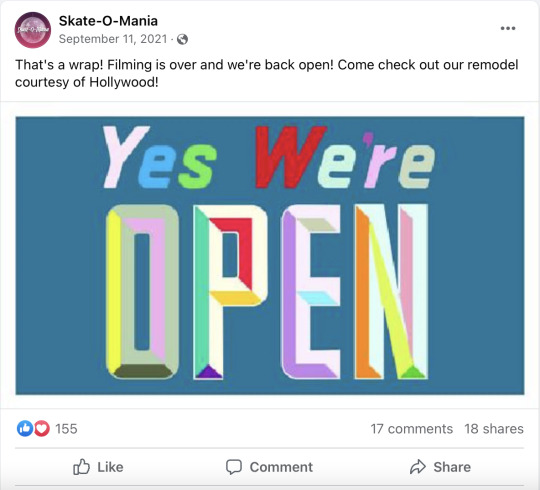
"Remodel courtesy of Hollywood" They deadass redecorated the entire roller rink for the however many minutes spent in ONE episode of the season. (The probably spent half the month redecorating and the other half filming which I'm losing my mind over?? no way this is a one time setting).
LIKE– Let me show you the difference in before and after the remodelling
The Roller Rink Before and After.


They added the blue and yellow light strips and the disco ball. And I can’t say 100 but it looks like they removed the pink and green coloured light(?)
And they added the whole ‘Skate/Rink O’mania’ sign (basically everything honestly was added by them–)

The Snack Station Before and After.


Again, we see the blue and yellow lighting.
The Table/Seating Area Before and After.


And okay I’m sorry about the quality of the second one I couldn’t find a better photo from their Google maps gallery or Facebook bUT- you can see that originally the lighting scheme was pink and blue but now it’s yellow and blue.
(here's another photo)

Like idk I’m losing my mind over this- they really like remodelled the entire fucking roller rink and added so much yellow and blue like?? I just think it's insane and I needed to share this discovery.
#byler#mike wheeler#will byers#stranger things#stranger things 4#stranger things analysis#I have no idea if anyones done this before#hopefully this just helps prove that everything in the set is literally 100% intentional
1K notes
·
View notes
Text
Advanced Tumblr Things I Would Pay For as a Content Creator Fuck I Hate That Fucking Term But It's What We Use Now
A Google Cal etc. connection so I could manage an editorial calendar far easier. When things are in in queue they are COLOR A. When they have posted they are COLOR B. If I move them on Google Calendar, it updates in Tumblr's backed system... so I can manage it via Google Cal.
A Pinterest connection button where things would crosspost. This would be a button below "Post now" that would give me a drop down option of what board, if any, to post it to.
A Facebook/Instagram connection cross post button.

I understand the feelings a lot of people have about Facebook and Instagram.
And.
I have a lot of folks who like my stuff that are on Facebook and Instagram.
Whenever I talk about Facebook on Tumblr I invariably get a comment or ask "pfft your'e still on Facebook?"
My fellow.
I am building a business.
If people like spooky things are on Facebook, I'm going to have a Facebook place for me to put spooky things here.
Allow me to specifically pin a post into a backend dashboard so I can see how a specific post is doing with likes, reblogs, what it is tagged with, etc.
A dashboard that brings up the tags people have added to my posts. A slider so I can say "show me every tag everywhere" vs. "show me the... 5 most popular tags."
A dashboard that would show me a heatmap of popular times and days of the week things of mine get posted. For me, personally, this is more a comfort in "it rarely matters because this is Tumblr" versus trying to pinpoint or optimize things. I am including this specifically because I LIKE DATA and this IS EXISTING METADATA so is an easy (...easy-ish... none of this is easy) win.

A second queue. Works exactly like the first -- CONNECTED AS ABOVE WITH CALENDAR -- that let's me build a specific queue for "Hey! We have a new greeting card for sale!" The benefit of a second queue being I can pop things into here without worrying about timing and have it set to "run this once a week." Sometimes a "Hey we have a widget for sale" post needs to be scheduled. Sometimes I just need to have it run once a week.
The ability to reply to MESSAGES and INBOX and all other things via email. You know how in most support systems you get "Reply to this email to continue thread?" I am an email person. I am not a Tumblr Inbox person. I am not a Tumblr Chat person. I am an email person. Let me use this as a hub.
Speaking of email: An alert I can set up that sends me a weekly report of how many items are in queue.
An email alert I can set up when my queue hits [a figure I set].

Facebook has surprisingly robust dashboards on how posts do. Their backend system is a fucking nightmare so don't do that, but the idea of being able to quickly understand "This post about mermaids did well" and "this post about vampires did better" is good.
As above, help me understand "Early July is a surprisingly good time for your posts about vampires. Cemeteries not so much -- that is great for August, though."
A Shopify plugin. Let me add "add to cart" on a post.
A MailChimp and other email plugin. Let me add "sign up for newsletter" on a post.
I don't want data on how other people are using this platform. I want data on how other people interact with my posts.
I will pay monthly for this. The immediate justification is easy: "this would help me sell a few more zines to people who already like my zines and have stated they wish to be informed when I have new zines."
I have my email settled in place but as a bonus option: You have domains, which make sense.
Start a "We are Tumblr, here is how to manage a domain" Tumblr where you regularly post articles about domain management.
Add an email system -- just fucking partner with Google or similar, don't build a goddamn email system.

Tumblr's audience is full of weirdos making weird shit.
I can tell you from personal experience: "Hello fellow weirdo who wishes to Make Small Things for Sale. Let me help you figure out a small issue so you can take a step closer" is a viable business model.
Become the social media platform that lets folks say "I want to occasionally sell this thing I do as a hobby. And/or. I am literally just starting out. Help me do that."

@staff text me I'm cute and I have ideas.
Some of them even make sense.
154 notes
·
View notes
Text
i've been thinking about this post

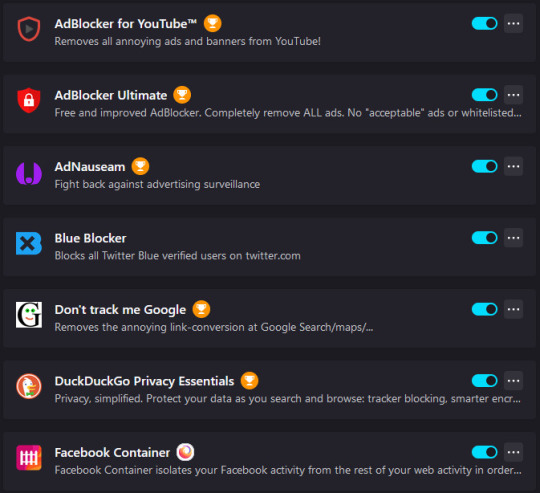


ever since i came across it because it bugs me so much ghjdfgd so many of the extensions listed there are redundant, either because they do each other's job or their functions have been implemented natively in firefox + the less extensions, the better! it's less surface area available for "attack"
i recommend the electronic frontier foundation's cover your tracks tool to check how well you're protected against web trackers (as for fingerprinting, i know brave combats canvas fingerprinting via filter lists - like firefox - and by randomizing a user's fingerprint, but it's a chromium browser. canvas blockers tend to impact usability. for day-to-day use you might just want to reduce data available to fingerprints, because to avoid that altogether i'm afraid you're better off using tor)
i'm going through the list above after the read more; i'm no expert, i've just spent a lot of my free time looking into how to improve my privacy and security habits and this is what my brain retained + don't believe me because i say so + feel free to point out any mistakes of mine.
🟩 keep
ublock origin. filter lists you should consider adding:
check Privacy > AdGuard URL Tracking Protection
add Actually Legitimate URL Shortener Tool (explained how here)
check out the arkenfox project's github page too!
🟨 optional
sponsorblock (1) & unhook (2) for yt. i personally don't use either because (1) i'm good with the good old dragging the current time indicator past sponsorship sections and (2) i'm also good at ignoring page elements i don't care about, but that's me obvs.
facebook container (& not listed above but multi-account containers too; differences between the two: x, x): total cookie protection (enabled by setting firefox's privacy protection to "strict") already partitions third parties, but these extensions could provide a further layer of isolation. container tabs + "Delete cookies and site data when Firefox is closed" + "Manage Exceptions" is excellent cookie management with no other extensions necessary
🟥 don't bother
total cookie protection makes ghostery, privacy badger & privacy possum redundant
you've got ublock origin so adblocker ultimate, ad nauseam & adblocker for youtube are also redundant. if you still see yt ads, remove all custom filters related to youtube on ublock origin and force update your lists
https-only mode has been introduced to all the main browsers so https everywhere is also redundant
trackmenot. it's unverified and indeed i've never seen it recommended in any of the multiple firefox hardening videos and guides i've checked, it's kinda useless unless you're a regular google or bing user. prefer a privacy-focused search engine instead
(e.g. duckduckgo [advanced search tricks here and here] which cleans up bing results and has a lite version too! i've also seen startpage [which cleans up google results] recommended but it's had some controversies. for further info, i recommend checking this)
duckduckgo privacy essentials. i suppose (but i can't be sure) this was installed because when you try to add a search engine in firefox's settings you're redirected to the addons page WHICH IS STUPID OF THEM because you can add them via search bar (i did this with e.g. letterboxd)
don't track me google. for those random google searches you still might need, if you added all the filter lists above to ublock origin you should be fine, and if you aren't you're better off using skip redirect
jury's out on blue blocker because it's unverified. i'm not a twitter user either so i haven't checked it out
#should actually update the masterlist in my resources blog too. laziness though........#i only set to go through that list so i haven't added much but bypass paywalls is also a godsend#.txt#resources
81 notes
·
View notes
Text
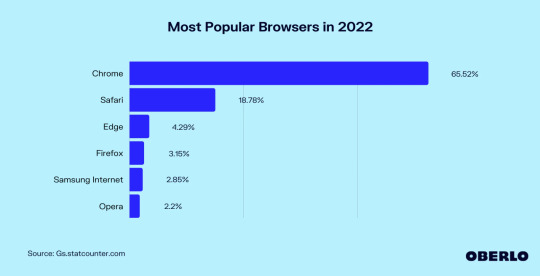
New game: Drop Google Chrome's market share 2023.
Why?
Monopolies are bad and that's what's gonna happen if things don't even out a bit.
Why is it bad if Google has a monopoly?
Because google already tracks the shit out of you, that's why. They collect and market your data. Yes, even in incognito mode. Just because your search history isn't being saved, doesn't mean google hasn't logged away where you've been or what you've searched for their own purposes.
Imagine what more they'll do if the competition snuffs out?
"But I'll use an ad-blocker. I'm good."
Not on Chrome you won't, because they're killing off ad-blockers in 2023, literally as soon as January- that's less than two months away. Gee... I wonder why they'd be doing that...
I recommend Firefox.
I switched a couple months ago and it's seriously so good.
It takes literal minutes to switch, you can import your bookmarks, passwords, browsing history, and even your open tabs from chrome to firefox.
Oh- and they don't collect and market your data.
And the extensions are amazing:
uBlock Origin blocks ads, trackers, coin miners, popups, etc. Hate those annoying ads before YouTube videos? I haven't had one since installing- and it literally never occurred to me for some reason that ad blockers would work on YouTube too. (It also got rid of the ads on tumblr, which I also didn't expect to happen)
There's Auto Tab Discard for people like me who always have a ton of tabs open. It puts your inactive tabs to sleep (but doesn't close them! important!) to help save memory and battery
Facebook Container keeps Facebook from tracking you around the web. (Includes Insta and Facebook messenger)
There's Image Search Options, for when you want to properly credit an artist, or need to find the source of an image. You just right-click on the image and it gives you a list of 10+ top reverse image search engines to click on, and when you click one it automatically plugs the image into the search!
Youtube Audio saves you bandwidth and battery when you just want audio from YouTube (aka: to use Youtube as a music streaming service or listening to narration videos/podcasts)
Then of course there's XKit Rewritten, which I'm sure you'll already recognize as the thing that enhances the tumblr experience.
And there's so many others!
And I get it if you don't like change, and don't wanna deal if the browser appearance is either different than you're used to, or worse- ugly. I get it, I do. But the good news is if the only thing holding you back is that you've gotten used to how Chrome looks, Firefox Dark theme is literally so similar I didn't even notice the difference when I switched. (And I imagine the same is true of the light theme)
There's also literally a whole library of themes if you want a more customized look!
And some of you might be thinking "But I have a google account! GMail, Drive- Everything! Won't I have to stop using all that if I switch?"
NOPE. Being logged into Google isn't the same as being logged into Chrome. You can log right into Google on Firefox same as you would on any other browser and your experience with your mail, drive, etc. will be just the same as if you were in Chrome, just without the collecting and marketing of your data. (That reminds me, There's also extensions to prevent google from tracking you as well, like "Don't track me Google" and "Google Container")
But seriously, Firefox is so great. Not only does it not track you and market your data, it's genuinely just a better experience than Chrome.
If you've been putting off switching, consider this your sign to do it.
#firefox#chrome#google chrome#mozilla firefox#browsers#adblock#internet safety#internet#internet privacy#switch to firefox
392 notes
·
View notes
Note
do you mind sharing what web browser add ons you use? you seem to know your stuff and i feel like there's helpful stuff i've missed
my firefox extensions are pretty boring and sometimes cringe
AliExpress Superstar - okay so this one is the cringiest one. i like to buy a lot of dumb shit and it gives me a camelcamelcamel-type graph of what the price has been doing because sellers on ali love to have 'sales' that actually cost more than the item does normally. not really useful unless you also love bad decisions.
BitWarden - i switched to bitwarden as my primary password manager from lastpass and i regret nothing. i've been using the free version no problem but i keep meaning to upgrade so i can use my yubikey again.
ClearURLs - this gets rid of all the stuff after the ? in a url, in theory. lately it's been missing some cruft in twitter urls, and also has been interfering with pocket somehow? very confusing. i give this one a mixed review.
Facebook Container - keeps facebook in an isolated shame zone so they don't know what i'm up to.
Firefox Multi-Account Containers - firefox has containers built in but you need the extension if you want to set certain urls to always open in certain containers (i do this for amazon, aliexpress, google, and twitter because i don't trust them). iirc they recently added security features that maybe make the containers obsolete anyway? idk man
Greasemonkey - for installing userscripts like the ones on greasyfork. i don't have as many of these as i used to, but whatever.
Ignore X-Frame Options - this one's Niche lmao. websites disable loading in an x-frame because they don't want their site being embedded on another website or whatever but that means comic-rocket doesn't work on their site. and i like using comic-rocket to keep track of where i'm at so i can go back later if i accidentally forget to read anything for six months. which has happened. anyway that's the only reason i have this extension. hiveworks please stop blocking comic-rocket, i already disabled adblocking for comic-rocket, i'm not going to disable ads for every comic on your fucking network, calm down.
Library Extension - EVERYONE SHOULD INSTALL LIBRARY EXTENSION. god. it has saved me so much money. stopped me from so many impulse purchases. and it lets me look up whether something is on scribd instead of just the library which is handy for me specifically, since i have scribd and my library can be limited.
Inoreader Extension - i use inoreader so i have the extension. pretty self-explanatory. tells me how behind i am on reading the entire internet, also makes it easy to subscribe to feeds when i find a new one.
RSSPreview - firefox used to let you preview rss feeds by default but they broke it because they lack my dedication to keeping rss alive
Snap Links - okay. this one is maybe a weird one. it lets me click and drag with the right button to make a box and then open every link in the box in a new tab. sometimes there is a long list and i want to read all the things. or else load up a bunch of forum pages to read while i'm offline.
Something Awful Last Read Redux - i don't have to explain myself to you but also you will take keyboard nav out of my cold dead hands
SponsorBlock for YouTube - self-promo is fine but i don't need to hear about expressvpn
stutter - it does that thing where it lets you read things one word at a time to read really fast. i already read pretty fast but sometimes this forces me enough to focus on something when i'm having attention issues.
Stylus - this is the good one after stylish turned into spyware or whatever. i need to be able to tweak css to live.
Tapas RSS Button - tapas still has rss feeds but it hid them so i installed a thing to bring the buttons back. i could probably be using a userscript for this but whatever.
Translate Web Pages - it's pretty much google translate, i feel like there must be a better one because this one kind of sucks to configure but i'm lazy
uBlacklist - just recently installed this to never see pinterest or fandom.com in my search results. i will probably add more shitty websites as time goes on.
uBlock Origin - still my ad and script blocker of choice. makes it relatively easy both to block elements as well as to opt out and explain that i clicked that ad on purpose, which is a thing i do sometimes and i need my ad blocker to respect my poor choices without forcing me to permanently enable whatever website i wanted to see.
Web Scrobbler - yes i still use last.fm in 2022 and will continue to do so. i am trying to get scrobbling from rockbox to work as we speak. it's 2022 but i'm reverting back to 2008. catch me on myspace soon probably.
XKit Rewritten - imagine using tumblr without xkit. i would die.
#original#how to internet#i didn't actually need to tell you ALL of them like i'm confessing my sins but here we are
1K notes
·
View notes
Text
Doctor Who vs Sun Wukong
In December of 2023, a fellow member of the now private Monkey King Facebook group posted a link to this fandom article mentioning a two-part comic book story called "Reign of the Stone Monkey." It appeared in issues no. 54 (6–12 March 2008) and no. 55 (13–19 March 2008) of Doctor Who Adventures magazine. As a once passionate Whovian, I dutifully tracked down copies of the publication just so I could read it. I have attached scans below. Here is a PDF of the comic for anyone who wants to share it externally.
I must point out that the magazines are quite large and challenged even my A3-sized flatbed scanner. Therefore, parts of the pages were chopped off in places. You'll twice notice a vertical white line while reading. This was the result of me not being careful enough and a little too much was cropped. The white line maintains the correct spacing.
Anyway, back to the comic. To be frank, it is terrible beyond words. I think the editorial decision went something like this:
Editor: [Watches the trailer for The Forbidden Kingdom movie on TV] Wow! Jackie Chan and Jet Li? We better jump on this Monkey King thing, too.
Hey, writer ...
Writer: Yeah, boss?
Editor: ... your brother is married to an "Asian," right?
Writer: I guess. She's Filipino.
Editor: Close enough for me. I want you to whip up a script for a 10th Doctor versus the Monkey King comic book story.
Writer: The monkey what?
Editor: Just google "Monkey King." I want a script on my desk in ten minutes.
Beyond the bad story, the art direction is terrible as well. Instead of containing the action to the panels of a single page, it spills across to the other, making it difficult to read. The layout is so bad that translucent arrows are added to guide the reader's eye.








#Stone Monkey#Sun Wukong#Monkey King#Journey to the West#Zhu Bajie#Pigsy#Sha Wujing#Sandy#Doctor Who#The Doctor#Tenth Doctor#Doctor Who Adventures#JTTW#Lego Monkie Kid#LMK
25 notes
·
View notes
Text
Rating Pregnant Men Emojis

Apple - 3/10
Art feels flat somehow. He feels like a stock image. Not sensing any paternal pride in his dead eyes. This is still technically an emoji some tech-illiterate grandpa could use after having a big meal.

Google Noto Color Emoji - 7/10
This one feels like it's on the right path. He's gentle, it feels like he's connecting to the baby. I like how he's not staring at me. Anatomy still leaves a little to be desired but it's still a solid emoji imo.

Samsung - 5/10
It's like the google noto one but worse. Oddly shiny. His expression feels less like a gentle smile and more like a smirk. Anatomy is fine but a little flat. I don't feel good about this one but at least it's not staring at me.

Microsoft - 1/10
What the fuck. Why is he looking at me. Why does he look way too happy. Where is his elbow. His belly looks like a staircase. This is awful. Combines the worst traits of the previous emojis somehow. Hate it.

Whatsapp - 2/10
His baby bump looks like he's hiding a watermelon and he's staring at me again. His expression feels uncertain, possibly afraid. But I like his moustache so he gets an extra point.

Twitter - 0/10
Somehow even more flat than the previous ones. This looks like my first attempt at drawing a human posing. Just bad anatomy all around (why do his hands look like paws??). He's not looking at anything. Flat, emotionless, not communicating anything, might as well be abstract.

Facebook - 1/10
This style is reminiscent of every mobile game ad I've ever seen. Slightly more detail =/= better. I feel like he's gonna ask me to match 3 baby supplies and the ad is gonna fuck it up badly so he's out in the cold while his wife is with a generic chad and he's gonna ask me to download his app to fix his life.

JoyPixels - 0/10
I don't hate it as much as I hate the Facebook one but it definitely feels worse somehow. It feels like it tried to be the google noto color one but it didn't stick the landing. It feels like a bootleg emoji.

Toss Face - 8/10
I'm grateful for the simplicity and lack of hyper realistic details here. He's a little pregnant emoji guy. What else is there to say.

Noto Emoji Font - 9/10
"MR GAME AND WATCH PREGNANCY" -my partner when I showed him this one. Anyway besides looking like a guy with a beer belly it's straight to the point. People will see what they need to see with this one.

Openmoji - 8/10
I'm not a fan of the style here, but I love the addition of the heart. He loves his baby. Other emojis could learn from this one.

Emojipedia - 0/10
My partner thinks he's sneaking food into the theatre. I think he's taking a shit.
139 notes
·
View notes
Text
All right, since I bombarded a poor mutual yesterday...
Privacy is not security and security is not privacy. These terms are not interchangeable, but they are intrinsically linked.
While we're at this, anonymity =/= security either. For example, Tor provides the former, but not necessarily the latter, hence using Https is always essential.
It is impossible to have privacy without security, but you can have security without privacy.
A case in point is administrators being able to view any data they want due to their full-access rights to a system. That being said, there are ethics and policies that usually prevent such behavior.
Some general tips:
Operating System: Switch to Linux. Ubuntu and Linux Mint are widely used for a reason. Fedora too. And don't worry! You can keep your current operating system, apps and data. If you're on a Mac computer, you can easily partition your hard drive or SSD by using Disk Utility. If you're on Windows, you can follow this guide.
You want to go a step further? Go with Whonix or Tails. They're Linux distributions as well, but they're both aiming for security, not beauty so the interface might not be ideal for everyone. Many political activists and journalists use them.
You want anonymity? Then you need to familiarize yourself with Tor. Also, Tor and HTTPS and Tor’s weaknesses. When you're using it, don't log in to sites like Google, Facebook, Twitter etc. and make sure to stay away from Java and Javascript, because those things make you traceable.
Alternatives for dealing with censorship? i2p and Freenet.
Is ^ too much? Welp. All right. Let's see. The first step is to degoogle.
Switch to a user-friendly browser like Firefox (or better yet LibreWolf), Brave or Vivaldi. There are plenty of hardened browsers, but they can be overwhelming for a beginner.
Get an ad blocker like Ublock Origin.
Search Engine? StartPage or Duckduckgo. SearXNG too. Like I said degoogle.
Get a PGP encrypted e-mail. Check Protonmail out.
There's also Tutamail that doesn't cover PGP, but uses hybrid encryption that avoids some of the cons of PGP.
Skiff mail is also a decent option.
Use an e-mail aliasing service such as SimpleLogin or AnonAddy.
Check OpenPGP out. Claws Mail is a good e-mail client for Windows and Linux, Thunderbird for Mac OS.
Gpg4win is free and easy to use for anyone that wants to encrypt/decrypt e-mails.
Instead of Whatsapp, Facebook messenger, Telegram etc. use Signal for your encrypted insant messaging, voice and video calls.
Get a metadata cleaner.
Get a firewall like Opensnitch, Portmaster or Netguard which can block Internet for trackers.
Alternatively, go with a private DNS that blocks these trackers. NextDNS is a good paid service. Rethink a good free option.
Replace as many of your applications as you can with FOSS (free and open source) ones. Alternativeto can help you.
Always have automatic updates on. They are annoying af, I know, but they are necessary.
Keep your distance from outdated software.
Always have two-factor authentication (2FA) enabled.
Do not use your administrator account for casual stuff. If you're on Linux, you probably know you can be sudo, but not root.
On Linux distributions use AppArmor, but stay away from random antivirus scanners. Other distributions default to SELinux, which is less suited to a beginner.
Never repeat your passwords. If you can't remember them all, use a password manager like KeePass.
Encrypt your drive.
Honestly, VPNs have their uses and ProtonVPN, Mullvad and Windscribe are decent, but eh. If you don't trust your ISP, why would you trust the VPN provider that claims they don't log you when you can't verify such a thing?
29 notes
·
View notes
Text
Apple to EU: “Go fuck yourself”

If you'd like an essay-formatted version of this post to read or share, here's a link to it on pluralistic.net, my surveillance-free, ad-free, tracker-free blog:
https://pluralistic.net/2024/02/06/spoil-the-bunch/#dma

There's a strain of anti-anti-monopolist that insists that they're not pro-monopoly – they're just realists who understand that global gigacorporations are too big to fail, too big to jail, and that governments can't hope to rein them in. Trying to regulate a tech giant, they say, is like trying to regulate the weather.
This ploy is cousins with Jay Rosen's idea of "savvying," defined as: "dismissing valid questions with the insider's, 'and this surprises you?'"
https://twitter.com/jayrosen_nyu/status/344825874362810369?lang=en
In both cases, an apologist for corruption masquerades as a pragmatist who understands the ways of the world, unlike you, a pathetic dreamer who foolishly hopes for a better world. In both cases, the apologist provides cover for corruption, painting it as an inevitability, not a choice. "Don't hate the player. Hate the game."
The reason this foolish nonsense flies is that we are living in an age of rampant corruption and utter impunity. Companies really do get away with both literal and figurative murder. Governments really do ignore horrible crimes by the rich and powerful, and fumble what rare, few enforcement efforts they assay.
Take the GDPR, Europe's landmark privacy law. The GDPR establishes strict limitations of data-collection and processing, and provides for brutal penalties for companies that violate its rules. The immediate impact of the GDPR was a mass-extinction event for Europe's data-brokerages and surveillance advertising companies, all of which were in obvious violation of the GDPR's rules.
But there was a curious pattern to GDPR enforcement: while smaller, EU-based companies were swiftly shuttered by its provisions, the US-based giants that conduct the most brazen, wide-ranging, illegal surveillance escaped unscathed for years and years, continuing to spy on Europeans.
One (erroneous) way to look at this is as a "compliance moat" story. In that story, GDPR requires a bunch of expensive systems that only gigantic companies like Facebook and Google can afford. These compliance costs are a "capital moat" – a way to exclude smaller companies from functioning in the market. Thus, the GDPR acted as an anticompetitive wrecking ball, clearing the field for the largest companies, who get to operate without having to contend with smaller companies nipping at their heels:
https://www.techdirt.com/2019/06/27/another-report-shows-gdpr-benefited-google-facebook-hurt-everyone-else/
This is wrong.
Oh, compliance moats are definitely real – think of the calls for AI companies to license their training data. AI companies can easily do this – they'll just buy training data from giant media companies – the very same companies that hope to use models to replace creative workers with algorithms. Create a new copyright over training data won't eliminate AI – it'll just confine AI to the largest, best capitalized companies, who will gladly provide tools to corporations hoping to fire their workforces:
https://pluralistic.net/2023/02/09/ai-monkeys-paw/#bullied-schoolkids
But just because some regulations can be compliance moats, that doesn't mean that all regulations are compliance moats. And just because some regulations are vigorously applied to small companies while leaving larger firms unscathed, it doesn't follow that the regulation in question is a compliance moat.
A harder look at what happened with the GDPR reveals a completely different dynamic at work. The reason the GDPR vaporized small surveillance companies and left the big companies untouched had nothing to do with compliance costs. The Big Tech companies don't comply with the GDPR – they just get away with violating the GDPR.
How do they get away with it? They fly Irish flags of convenience. Decades ago, Ireland started dabbling with offering tax-havens to the wealthy and mobile – they invented the duty-free store:
https://en.wikipedia.org/wiki/Duty-free_shop#1947%E2%80%931990:_duty_free_establishment
Capturing pennies from the wealthy by helping them avoid fortunes they owed in taxes elsewhere was terribly seductive. In the years that followed, Ireland began aggressively courting the wealthy on an industrial scale, offering corporations the chance to duck their obligations to their host countries by flying an Irish flag of convenience.
There are other countries who've tried this gambit – the "treasure islands" of the Caribbean, the English channel, and elsewhere – but Ireland is part of the EU. In the global competition to help the rich to get richer, Ireland had a killer advantage: access to the EU, the common market, and 500m affluent potential customers. The Caymans can hide your money for you, and there's a few super-luxe stores and art-galleries in George Town where you can spend it, but it's no Champs Elysees or Ku-Damm.
But when you're competing with other countries for the pennies of trillion-dollar tax-dodgers, any wins can be turned into a loss in an instant. After all, any corporation that is footloose enough to establish a Potemkin Headquarters in Dublin and fly the trídhathach can easily up sticks and open another Big Store HQ in some other haven that offers it a sweeter deal.
This has created a global race to the bottom among tax-havens to also serve as regulatory havens – and there's a made-in-the-EU version that sees Ireland, Malta, Cyprus and sometimes the Netherlands competing to see who can offer the most impunity for the worst crimes to the most awful corporations in the world.
And that's why Google and Facebook haven't been extinguished by the GDPR while their rivals were. It's not compliance moats – it's impunity. Once a corporation attains a certain scale, it has the excess capital to spend on phony relocations that let it hop from jurisdiction to jurisdiction, chasing the loosest slots on the strip. Ireland is a made town, where the cops are all on the take, and two thirds of the data commissioner's rulings are eventually overturned by the federal court:
https://www.iccl.ie/digital-data/iccl-2023-gdpr-report/
This is a problem among many federations, not just the EU. The US has its onshore-offshore tax- and regulation-havens (Delaware, South Dakota, Texas, etc), and so does Canada (Alberta), and some Swiss cantons are, frankly, batshit:
https://lenews.ch/2017/11/25/swiss-fact-some-swiss-women-had-to-wait-until-1991-to-vote/
None of this is to condemn federations outright. Federations are (potentially) good! But federalism has a vulnerability: the autonomy of the federated states means that they can be played against each other by national or transnational entities, like corporations. This doesn't mean that it's impossible to regulate powerful entities within a federation – but it means that federal regulation needs to account for the risk of jurisdiction-shopping.
Enter the Digital Markets Act, a new Big Tech specific law that, among other things, bans monopoly app stores and payment processing, through which companies like Apple and Google have levied a 30% tax on the entire app market, while arrogating to themselves the right to decide which software their customers may run on their own devices:
https://pluralistic.net/2023/06/07/curatorial-vig/#app-tax
Apple has responded to this regulation with a gesture of contempt so naked and broad that it beggars belief. As Proton describes, Apple's DMA plan is the very definition of malicious compliance:
https://proton.me/blog/apple-dma-compliance-plan-trap
Recall that the DMA is intended to curtail monopoly software distribution through app stores and mobile platforms' insistence on using their payment processors, whose fees are sky-high. The law is intended to extinguish developer agreements that ban software creators from informing customers that they can get a better deal by initiating payments elsewhere, or by getting a service through the web instead of via an app.
In response, Apple, has instituted a junk fee it calls the "Core Technology Fee": EUR0.50/install for every installation over 1m. As Proton writes, as apps grow more popular, using third-party payment systems will grow less attractive. Apple has offered discounts on its eye-watering payment processing fees to a mere 20% for the first payment and 13% for renewals. Compare this with the normal – and far, far too high – payment processing fees the rest of the industry charges, which run 2-5%. On top of all this, Apple has lied about these new discounted rates, hiding a 3% "processing" fee in its headline figures.
As Proton explains, paying 17% fees and EUR0.50 for each subscriber's renewal makes most software businesses into money-losers. The only way to keep them afloat is to use Apple's old, default payment system. That choice is made more attractive by Apple's inclusion of a "scare screen" that warns you that demons will rend your soul for all eternity if you try to use an alternative payment scheme.
Apple defends this scare screen by saying that it will protect users from the intrinsic unreliability of third-party processors, but as Proton points out, there are plenty of giant corporations who get to use their own payment processors with their iOS apps, because Apple decided they were too big to fuck with. Somehow, Apple can let its customers spend money Uber, McDonald's, Airbnb, Doordash and Amazon without terrorizing them about existential security risks – but not mom-and-pop software vendors or publishers who don't want to hand 30% of their income over to a three-trillion-dollar company.
Apple has also reserved the right to cancel any alternative app store and nuke it from Apple customers' devices without warning, reason or liability. Those app stores also have to post a one-million euro line of credit in order to be considered for iOS. Given these terms, it's obvious that no one is going to offer a third-party app store for iOS and if they did, no one would list their apps in it.
The fuckery goes on and on. If an app developer opts into third-party payments, they can't use Apple's payment processing too – so any users who are scared off by the scare screen have no way to pay the app's creators. And once an app creator opts into third party payments, they can never go back – the decision is permanent.
Apple also reserves the right to change all of these policies later, for the worse ("I am altering the deal. Pray I don't alter it further" -D. Vader). They have warned developers that they might change the API for reporting external sales and revoke developers' right to use alternative app stores at its discretion, with no penalties if that screws the developer.
Apple's contempt extends beyond app marketplaces. The DMA also obliges Apple to open its platform to third party browsers and browser engines. Every browser on iOS is actually just Safari wrapped in a cosmetic skin, because Apple bans third-party browser-engines:
https://pluralistic.net/2022/12/13/kitbashed/#app-store-tax
But, as Mozilla puts it, Apple's plan for this is "as painful as possible":
https://www.theverge.com/2024/1/26/24052067/mozilla-apple-ios-browser-rules-firefox
For one thing, Apple will only allow European customers to run alternative browser engines. That means that Firefox will have to "build and maintain two separate browser implementations — a burden Apple themselves will not have to bear."
(One wonders how Apple will treat Americans living in the EU, whose Apple accounts still have US billing addresses – these people will still be entitled to the browser choice that Apple is grudgingly extending to Europeans.)
All of this sends a strong signal that Apple is planning to run the same playbook with the DMA that Google and Facebook used on the GDPR: ignore the law, use lawyerly bullshit to chaff regulators, and hope that European federalism has sufficiently deep cracks that it can hide in them when the enforcers come to call.
But Apple is about to get a nasty shock. For one thing, the DMA allows wronged parties to start their search for justice in the European federal court system – bypassing the Irish regulators and courts. For another, there is a global movement to check corporate power, and because the tech companies do the same kinds of fuckery in every territory, regulators are able to collaborate across borders to take them down.
Take Apple's app store monopoly. The best reference on this is the report published by the UK Competition and Markets Authority's Digital Markets Unit:
https://assets.publishing.service.gov.uk/media/63f61bc0d3bf7f62e8c34a02/Mobile_Ecosystems_Final_Report_amended_2.pdf
The devastating case that the DMU report was key to crafting the DMA – but it also inspired a US law aimed at forcing app markets open:
https://www.congress.gov/bill/117th-congress/senate-bill/2710
And a Japanese enforcement action:
https://asia.nikkei.com/Business/Technology/Japan-to-crack-down-on-Apple-and-Google-app-store-monopolies
And action in South Korea:
https://www.reuters.com/technology/skorea-considers-505-mln-fine-against-google-apple-over-app-market-practices-2023-10-06/
These enforcers gather for annual meetings – I spoke at one in London, convened by the Competition and Markets Authority – where they compare notes, form coalitions, and plan strategy:
https://www.eventbrite.co.uk/e/cma-data-technology-and-analytics-conference-2022-registration-308678625077
This is where the savvying breaks down. Yes, Apple is big enough to run circles around Japan, or South Korea, or the UK. But when those countries join forces with the EU, the USA and other countries that are fed up to the eyeballs with Apple's bullshit, the company is in serious danger.
It's true that Apple has convinced a bunch of its customers that buying a phone from a multi-trillion-dollar corporation makes you a member of an oppressed religious minority:
https://pluralistic.net/2024/01/12/youre-holding-it-wrong/#if-dishwashers-were-iphones
Some of those self-avowed members of the "Cult of Mac" are willing to take the company's pronouncements at face value and will dutifully repeat Apple's claims to be "protecting" its customers. But even that credulity has its breaking point – Apple can only poison the well so many times before people stop drinking from it. Remember when the company announced a miraculous reversal to its war on right to repair, later revealed to be a bald-faced lie?
https://pluralistic.net/2023/09/22/vin-locking/#thought-differently
Or when Apple claimed to be protecting phone users' privacy, which was also a lie?
https://pluralistic.net/2022/11/14/luxury-surveillance/#liar-liar
The savvy will see Apple lying (again) and say, "this surprises you?" No, it doesn't surprise me, but it pisses me off – and I'm not the only one, and Apple's insulting lies are getting less effective by the day.

Image:
Alex Popovkin, Bahia, Brazil from Brazil (modified)
https://commons.wikimedia.org/wiki/File:Annelid_worm,_Atlantic_forest,_northern_littoral_of_Bahia,_Brazil_%2816107326533%29.jpg
CC BY 2.0
https://creativecommons.org/licenses/by/2.0/deed.en
--
Hubertl (modified)
https://commons.wikimedia.org/wiki/File:2015-03-04_Elstar_%28apple%29_starting_putrefying_IMG_9761_bis_9772.jpg
CC BY-SA 4.0
https://creativecommons.org/licenses/by-sa/4.0/deed.en
#pluralistic#apple#malicious compliance#dma#digital markets act#eu#european union#federalism#corporatism#monopolies#trustbusting#regulation#protonmail#junk fees#cult of mac#interoperability#browser wars#firefox#mozilla#webkit#browser engines
595 notes
·
View notes
Text
for the sake of consistency I feel compelled to point this out: I feel like I'm seeing a warped false dichotomy-ish thing spring up where people are responding to the "tiktok is a national security threat to america" hysteria with a counter that american software companies collect data about users, largely for advertising purposes, which is true!
but some of this seems to wrap around to an assumption that tiktok doesn't engage in garden-variety data collection for any reason at all... except they very much do lol. because tiktok is also an advertising platform at its core, to the tune of $11B of revenue in 2022. which I'm not trying to offer as a gotcha, just that I wouldn't be all "well you gotta hand it to them" about data collection practices in the same breath that you lampoon american companies' practices because tiktok's functionally not much different from any other advertising-supported platform in that regard.
WHICH, IMPORTANT CAVEAT, is a completely neutral statement on my part. not only am I famously pretty lukewarm on the privacy threat posed by advertising data, but also what I'm trying to get at here is that tiktok's data collection serves the exact same purpose as any other big platform's data collection, which is Making Money. it's all the same. you could even argue that the big monolithic publishers like tiktok/reddit/facebook/google who source their own buyers are less leaky (and therefore less problematic in general) because their supply chains don't include a million third-party ad platforms per auction, and those third-party middlemen are often the ones who sell shit to data brokers, so tiktok's closed advertising ecosystem is actually better than some of these publishers with miles-long ads.txt files who'll do business with anybody.
but like, for example: pixel tracking is a common way to track ad conversions by measuring how many users click on ads and do stuff on the website that the ad leads to. facebook has the facebook meta pixel, reddit has the reddit pixel, tiktok has the tiktok pixel... exact same tech. exact same reason. no espionage, just ads for those mobile games where you're trying to solve a weird maze thing before some guy drowns in lava
#the reddit pixel documentation is ass btw#when I interviewed with them (before they ghosted me lol) one of my assessments was to rewrite it#and this clearly wasn't a 'we're just using this for free labor' situation because that doc is still as bad as I remembered 🫡
18 notes
·
View notes
Text
Also another thing I know nothing about and not sure how to go about learning: evolution and human history.
I know the basics, that over billions of years life evolved via mutations in a variety of ways based on surroundings and survival, but I would like to know at least a high schoolers understanding of the subject since I was deprived of that in my evangelical education. History was pretty good overall but extremely biased, plus it’s been over ten years since I was in school so it’s hard to recall anything.
Like, humans. We were very hairy regular great apes. What happened to make us less hairy smarter apes? How far back do you gotta go to find Neanderthals and Homo sapiens common ancestor? Also Why are there no mammoths, did early humans really genocide them or was there a another problem for them after the Ice Age?
Also I think human civilization as we know it that’s recorded well started near the Euphrates and Sumer in the lower Middle East, right? so how’d we get there from Africa. And Why didn’t big civilizations develop in other parts of Africa besides Egypt? Also, Why did Europe take over everything, Europeans aren’t any smarter than other kinds of people, why and how did they advance so quickly into the conquering skill tree and why were they so successful at this awful talent.
In short I have many many questions and now at almost thirty and finally getting to a better point in my mental health I realize I want to be someone who knows stuff about the world I live in from actual material and not Twitter and tumblr and Facebook posts that are often misinformation.
TLDR: if anyone knows good books and articles on these subjects ( evolution and human history) let me know. Google is full of AI junk and SEO ads and shit so besides Wikipedia I don’t really trust what I search up on there.
24 notes
·
View notes
Text
Use the app for a better experience! Only available to logged in users! We're sorry, you're out of free views the month. Get more with a premium membership! Click here to close ads! Would you like to receive notifications? Sign up for our newsletter! Please disable your adblock to view this content! Click skip advertisement in 5 seconds! Click next for page 2/10! Explore Marvel and Disney related pages! This page would like to use your location. Please verify your email address before continuing. Your free trial has ended! We're sorry, this page is no longer available. This video is available for free users in 2 months. Click here to configure your email subscriptions. Unable to skip ad. Follow us on Twitter! Follow us on Facebook! Multiple downloading only available for premium members. Recommended content. Sponsored content. Premium content. Trending content. "For You" content. Related news. Please log in to continue. Click here to prove you're not a robot. This content is not available in your region. This content has been pulled for DMCA. This post violated our policy against adult or sensitive content. This term has been filtered. This account is no longer available. Must be logged in to view sensitive content. Use the app to continue. Save 20% on an annual subscription! This search term has been banned. Your post is being flagged for adult content. Your account has been suspended. Purchase premium currency in the shop. Save 50% on premium for the first 3 months! This account is being accessed from a new device. Check your email for a link to continue. Content unavailable because another device is using this account. Trending news in your area. Trending news in entertainment, sports, politics. Allow this app to make or receive calls, access your location, and access your media and files. Please enter your subscription key to continue downloading. Free user access ending soon. Adult content has been hidden. Sign in with Google or register a new account. This site would like to send you notifications. Please enter a valid phone number. Please enter a new email address. You're out of free articles this month.
#kassandra rambles#poetry#internet#social media#despair#capitalism#poems#the internet is an increasingly hostile and expensive place#simultaneously: it would be really funny though also if i blazed this also
160 notes
·
View notes